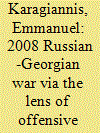| Srl | Item |
| 1 |
ID:
118003


|
|
|
|
|
| Publication |
2013.
|
| Summary/Abstract |
The Russian intervention in Georgia's breakaway republic of South Ossetia in August 2008, Moscow's first-ever use of military force against a sovereign state in the post-cold war period, deserves a theoretical explanation. By following the tenets of Offensive Realism, this article will argue that the US-Russian competition in the South Caucasus is the main cause of the 2008 Russian-Georgian war. During the 1990s, the USA passed the buck to Turkey to contain Russian influence in the South Caucasus. In the early to mid-2000s, however, the Russian-Turkish relations were improved so rapidly that the USA opted, through NATO expansion, to step in as an offshore balancer. Following Bush administration's decision to support the Georgian candidacy for NATO membership and Georgia's ill-fated attempt to seize South Ossetia, Moscow went to war to re-establish hegemony in the South Caucasus. In this way, as the theory of Offensive Realism claims, the Kremlin believes that Russian state will enhance its chances of survival in the anarchical international system.
|
|
|
|
|
|
|
|
|
|
|
|
|
|
|
|
| 2 |
ID:
177897


|
|
|
|
|
| Summary/Abstract |
Ten years after the Arab uprisings, China’s role in the Middle East and North Africa (MENA) region has become more prominent. Andrea Ghiselli and Maria Grazia Erika Giuffrida argue that China has adopted a strategy of offshore balancing to weaken US influence in that region without, however, making evident attempts to establish its own sphere of influence. They analyse China’s approach to Libya, Syria and Iran and draw important conclusions for how to understand China’s approach to regional crises, and regional and extra-regional actors.
|
|
|
|
|
|
|
|
|
|
|
|
|
|
|
|